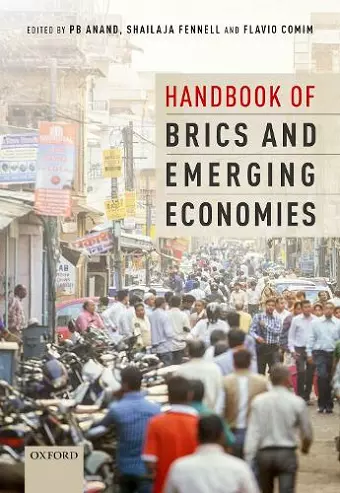Handbook of BRICS and Emerging Economies
Shailaja Fennell editor Flavio Comim editor PB Anand editor
Format:Hardback
Publisher:Oxford University Press
Published:17th Dec '20
Should be back in stock very soon

Ever since Jim O'Neill at Goldman Sachs coined the term BRICS in 2001 there have been many different assessments of these major emerging economies, with some even proclaiming that the promise of the BRICS (comprising Brazil, Russia, India, China, and South Africa) is over. However, the so called 'arranged marriage' still seems to be working well, with the club having become a formal international forum, with summit declarations, ministerial meetings, and numerous BRICS-wide fora. Is this euphoria misplaced? Is there a BRICS model of economic and human development? Are inequalities increasing and is this the denouncement of the economic successes? Are geo-political tensions rising between these nations? During the post COVID-19 situation, the importance of bilateral and multilateral co-operation mechanisms and institutions is becoming clear. This book focuses on one such emerging co-operation mechanism of BRICS but also more widely on those five countries and other similar economies. As a global depression looms large, global economic recovery depends on the performance of not only its largest economies but also many other important and significant economies within the so called G20 group. Even prior to the COVID-19 outbreak multilateral institutions have been under considerable strain, as with the relationship between the United States of America and China, and risks to global economic recovery appear very real. This book brings together multi-disciplinary perspectives from over sixty scholars and it presents a comprehensive and deep dive into the BRICS and emerging economies and into an understanding the political, economic, and social contexts that can help in designing approaches for recovery and regaining the last momentum in the journey towards the Sustainable Development Goals.
This Handbook covers an astonishingly diverse range of topics in the economics, political economy, human development, global governance and inter-governmental relations of BRICS and emerging economies. It achieves the formidable feat of exploring most of those topics comparatively across different countries, marrying detailed empirical data with incisive analytical reflection. The book will be an immensely rich, authoritative, and comprehensive resource for academics and policy-makers alike. * Professor Nandini Gooptu, Oxford Department for International Development *
When I coined the expression BRICs twenty years ago, I highlighted the importance of re-thinking the role of emerging economies and their potential in global economic prospects. I am thrilled to see this book comes out just in time for the twentieth anniversary. It is an exhaustive compilation of 43 chapters that provide an in-depth coverage of social, economic, environmental, institutional and global governance dimensions. Nearly a decade after my coining the expression, the five countries came together with formal summits. Presently at G7 and G20, the role of these economies and involving them for better global governance is being recognised. The ideas discussed in this book will be very useful for researchers as well as policy economists to navigate the complexities of global economic prospects over the coming decades. I am delighted to recommend this book to anyone interested in these issues. * Lord Jim O'Neill *
BRICS and emerging economies tend to be understood either as countries at an interim 'half-way point' on the development journey, as nations confronting a decisive set of unique policy challenges (e.g., 'the middle-income trap'), or as distinctive institutional actors offering (e.g., via the New Development Bank) an alternative model for giving and receiving development assistance. This carefully curated Handbook provides readers with insights on all three approaches, offering constructive analytical, empirical, and policy foundations on which to advance theory and practice. * Michael Woolcock, World Bank and Harvard University *
A very comprehensive book on the BRICS countries and other emerging economies covering a whole range of issues from social, environmental, political and governance and legal institutions. This book will be an asset for scholars wanting to carry out a comparative study on BRICS countries and other emerging economies. * Professor Subrata Sarkar, Indira Gandhi Institute of Development Research, Mumbai, India *
This is a formidable compilation of essays on diverse aspects of development in many of the new powerhouses of the global economy. The scope is outstanding, covering country-specific challenges and successes, as well as broader issues of global governance and collaboration that are so vital in these uncertain times. * Professor Ivan Turok, Executive Director of Human Sciences Research Council (HSRC) of South Africa and Editor in Chief of Regional Studies *
The Handbook of BRICS and Emerging Economies, edited by PB Anand, Shailaja Fennell, and Flavio Comim, will serve as an authoritative analysis of emerging economies for many years to come. The list of contributors to the volume and the coverage of topics is impressive. A must read for scholars and practitioners alike. * Kunal Sen, Director, UNU-WIDER *
ISBN: 9780198827535
Dimensions: 254mm x 196mm x 60mm
Weight: 2150g
1184 pages